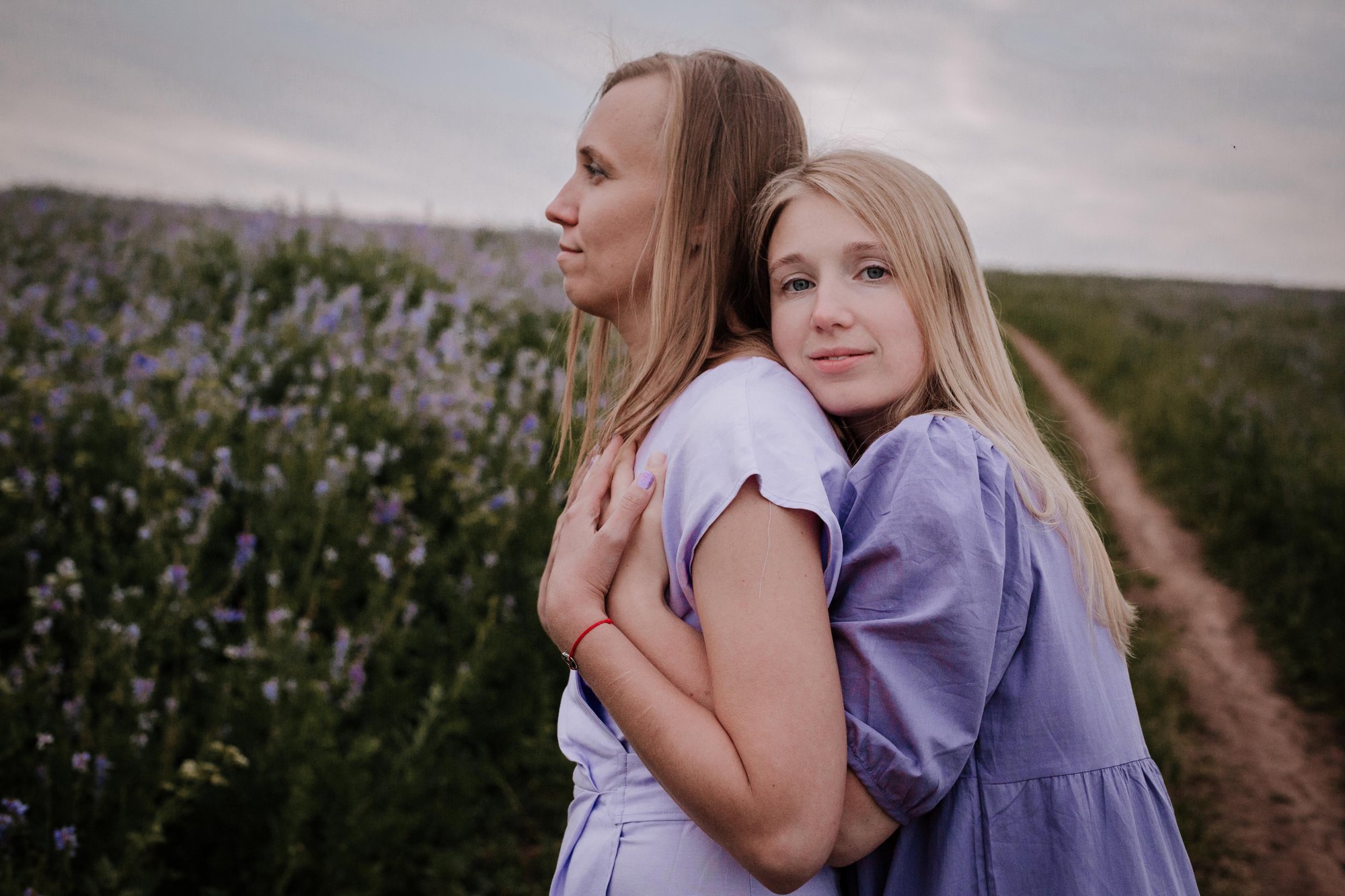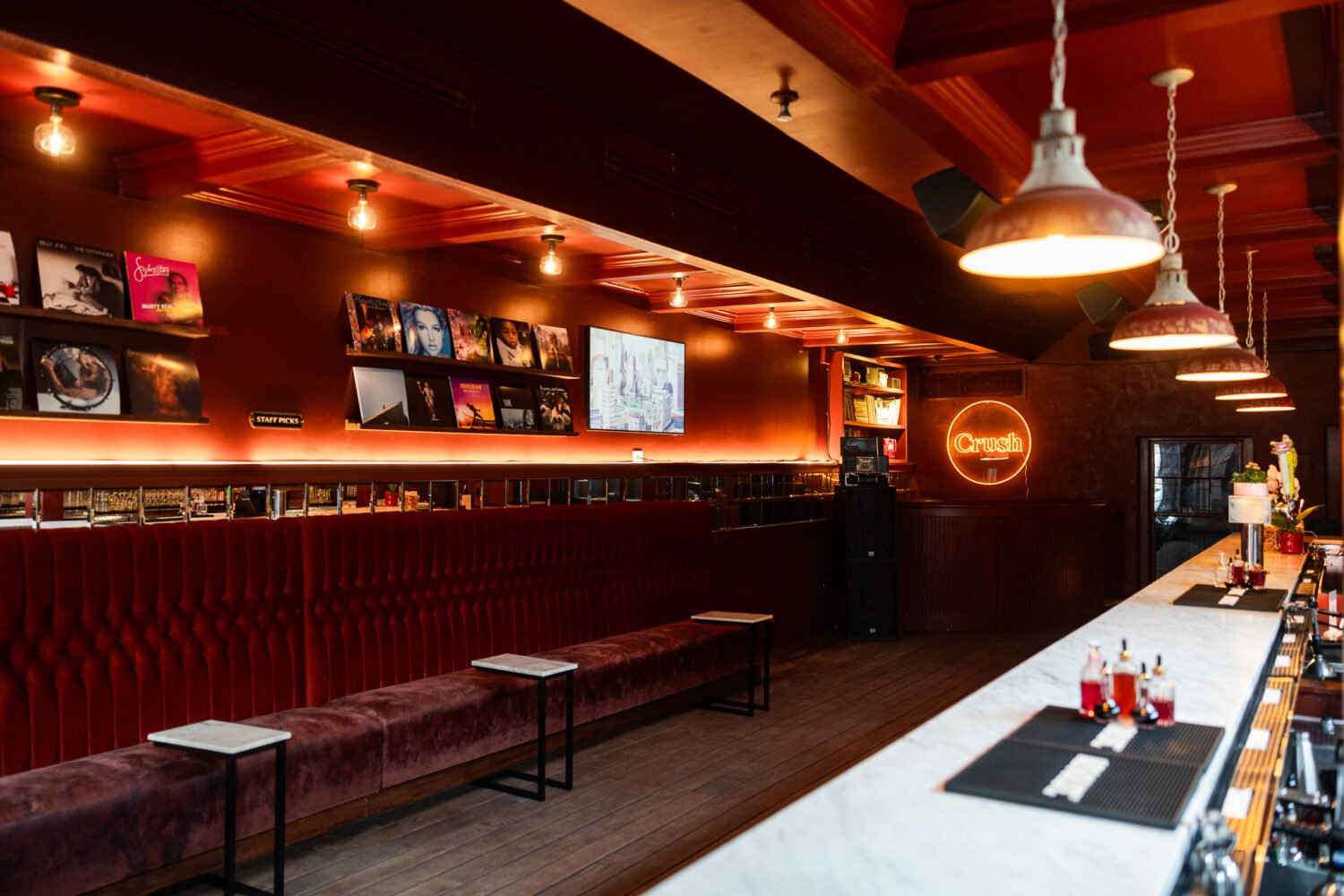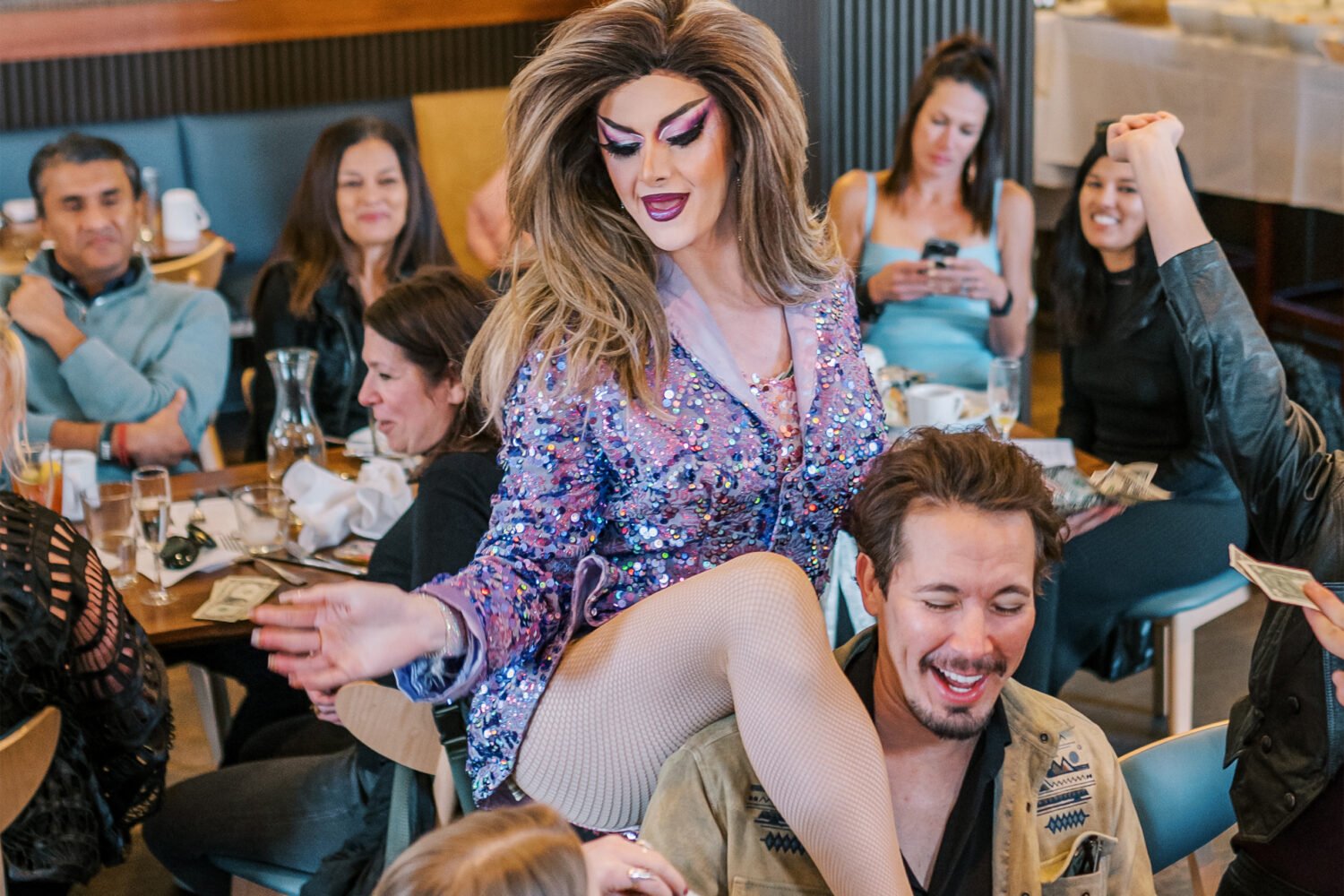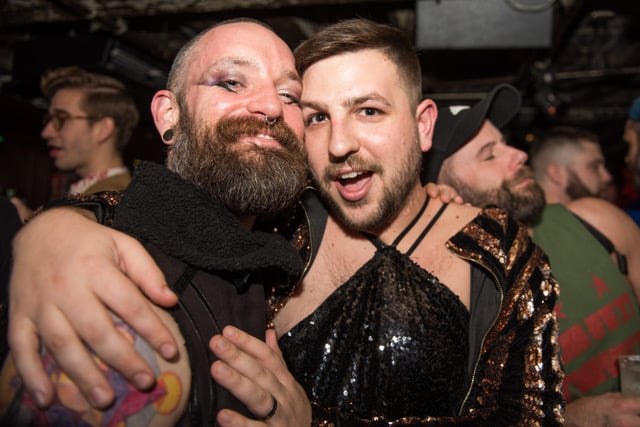On a freezing day in January 2021, Lera walked into a bakery and met her future wife. She had dressed up for their date, wearing shorts over tights under a long puffer coat, her corn-silk-blond hair brushed and smooth. Anya was already sitting at a table, nervously early. Lera said hello, noticing Anya’s lanky, athletic build and long, dirty-blond hair and thinking, she said later, “I’d never seen such a pretty girl.”
The two had matched about a week before on Tinder. Flirting over texts, they discussed their lives, their families—both women have young children—and the type of relationship each was looking for. In person, both felt an immediate spark. Anya, now 40, found Lera so “cute” that she got tongue-tied; when she told Lera she was nervous, Lera, now 36, laughed. “I’m not nervous at all,” said Lera, and Anya relaxed. They ordered pastries and tea and talked for a long time. One of the pastries was wrapped. When they pulled off the wrapping, they found a fortune written on the inside: “Dreams Come True.” Anya stuck the wrapping in her pocket. Later, she hung it on the wall above her desk at home.
So began Lera and Anya’s love story—and had they lived somewhere else, what happened next might have been simple. However, the two met in Perm, a city in central Russia, at a time when Vladimir Putin’s ongoing persecution of LGBTQ+ people was ramping up. In a year, the invasion of Ukraine would push Russian state-sponsored homophobia to new heights. For Lera and Anya, following their hearts meant embarking on a hazardous journey through violence and fear, one that would lead them to seek asylum halfway across the world in Northern Virginia. But in the warm, sweet-scented bakery on that cold winter day, neither woman saw any of that coming. “I thought it would be safe,” Lera says now through a translator. “I didn’t realize the dangers at all.”
Lera and Anya were both born under Soviet rule, which, beginning in the 1930s, made sex between men a crime. (Sex between women was never criminalized, but the regime was intolerant of same-sex relationships.) After the USSR’s dissolution in 1991, they lived through a more open period in Russia: Homosexuality was decriminalized, and the post-Soviet government, preoccupied with political and economic turmoil, didn’t spend a lot of time worrying about LGBTQ+ people.
Anya remembers seeing gay characters on television, and when, at a young age, she began having crushes on women, she had enough information to understand she was a lesbian. She also understood that would still entail risk, as Russian cultural hostility toward homosexuality remained potent. “I could feel a subtle homophobia from my parents that made me afraid,” she says, also speaking through a translator.
Since his ascension to prime minister in 1999, Putin has often moved to secure power and consolidate support by drumming up hatred against groups he labels “foreign agents,” dangerous to “traditional Russian values.” Following large protests against him and his regime in 2011–12, Putin promoted, and in 2013 signed into law, what’s known as the “gay-propaganda law”—officially intended to “protect children” from information about “nontraditional sexual relations” but effectively chilling public discussion of LGBTQ+ people and enabling a growing wave of anti-gay violence.
In this climate, Anya didn’t start dating women until after she finished college at age 24. She came out to some friends and her mother, and volunteered for Sphere Foundation, a Russian LGBTQ+ advocacy group. But mostly, she kept her sexual identity siloed off from her working life as a city-government lawyer and weekend ski instructor. She found this painful and limiting and couldn’t always count on support from her inner circle. At 32, Anya had a daughter with the help of a close male friend who offered to be a donor. In her later asylum application in federal immigration court in Virginia, Anya stated that her mother “has threatened on multiple occasions to report me to social services so that the court will take away custody of my daughter for living with women and having same-sex relationships with them.”
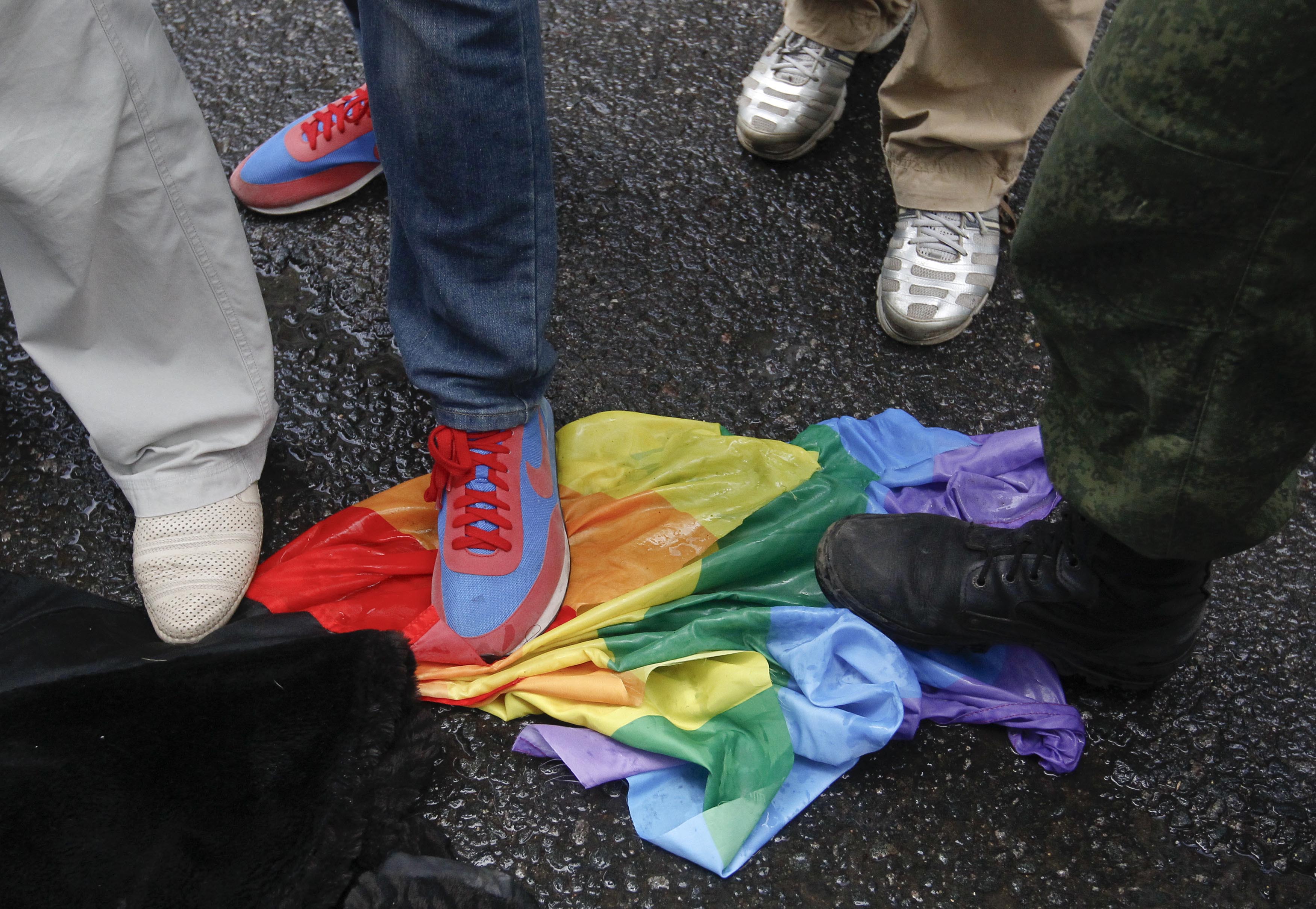
Lera grew up in what she describes as a strict religious cult, meeting her husband through the group when she was 15 and marrying him at 20. Her parents supported her going to college, which was rare for women in the group, and she later worked as an engineer while having a son and a daughter. But Lera was deeply depressed: lonely, hungry for connection, longing for a life outside the small apartment she shared with her family.
When Lera’s son was in preschool, she met another mother at his school, a woman with short hair who wore flannels and hosted a feminist film club. Lera realized she was in love with her and in 2019 decided to tell her husband she was bisexual and didn’t love him. “And that was a really silly decision,” she says with a dry laugh. In her immigration-court asylum application, Lera stated that her husband “became enraged and called me a pervert. . . . He screamed that he would handcuff me to the bed and rape me.” Later, she stated in her asylum application, he “repeatedly forced me to have sex with him against my will.”
After receiving counseling through Rainbow World, a support center operated by the Russian LGBT Network, Lera made a plan to leave. She began sleeping in her daughter’s room and told her husband she wanted a divorce. One night in fall of 2020, Lera stated in her asylum application, he entered her bedroom, dragged her by the legs, and beat her, with their daughter nearby. “He repeatedly kicked me and threatened to kill me,” Lera stated. “I told my parents I wanted a divorce but they said it is normal for men to beat and rape their wives and that it is my own fault and that I was ruining my children’s lives.”
Lera moved out and began dating women for the first time, which she calls “the best period of my life.” A few months later, she met Anya. Their early days together were joyful. For their second date, they saw a movie and spent the night together at Anya’s apartment—after which, Anya says, she began falling in love. Lera would leave Anya long, romantic voice memos, sometimes reading poems, which Anya would listen to on her morning commute.
About a month into their relationship, Lera says, her husband came by her new apartment to fix the washing machine. “But instead of fixing the machine, he began snooping around,” she stated in her asylum application. Finding a book “by a famous feminist author” and postcards from one of Lera’s friends, she stated, her husband “began tearing everything up and starting shouting that lesbians are nasty and vile and should not be allowed into his life, and he began destroying the furniture in front of the children. He promised to kill all my lesbian friends.”
As soon as he left, Lera called Anya, shaky and in tears. Anya came over with valerian, a calming herb. Lera was learning to rely on Anya, and Anya was impressed by Lera’s quiet toughness. “I saw how Lera can get very upset, but she moves forward,” Anya says. “Even when things are hard, she fights.” It was the beginning, Anya says, of her viewing Lera as a potential life partner.
Over the following months, their love grew in secret. In March, they took their first vacation to St. Petersburg, where they mostly didn’t leave their hotel room; they introduced their children to each other, although always as “my friend”; they began spending every moment possible together, mostly at Anya’s apartment. In October 2021, Lera divorced her husband, taking custody of their daughter while her ex took custody of their son, reflecting an arrangement that had existed informally during their separation. “I really wanted to take [my son], but I knew his father would never allow it,” Lera says. “And I was scared and didn’t want to fight him.”
The split, Lera says, didn’t grant her much freedom or safety. When her ex found out she had a girlfriend, Lera says, he told his mother, who one day picked up their children from school without Lera’s knowledge and briefly refused to let Lera take them home. “My ex-mother-in-law began pushing and shoving me and pulling my hair and hitting me repeatedly,” she stated in her asylum application. Another time, Lera stated in her application, her ex presented “a contract for custody of both children on the basis that ‘lesbians should not raise children.’ ”
“I was afraid to take my child to daycare,” Lera says. “I was afraid of everything.”
Lera wanted to stay and fight. “I believed in activism. I believed we could change things.”
Anya felt a similar sense of dread. Through her volunteer legal work helping LGBTQ+ families, she saw things go from bad to worse. Russia added language to its constitution banning same-sex marriage in 2020 and, the next year, placed new restrictions on the LGBT Network, the group that operated Rainbow World. Although a law that was proposed in 2013 to take children away from same-sex parents never passed, those parents understood that their custodial rights were tenuous.
On Instagram, Anya saw gay couples leave the country. Lera would always tell Anya she wanted to stay and fight. “I believed in activism,” Lera says. “That we could change things.” Increasingly, Anya had doubts. “When you are flying and the plane is going down,” she says, “you know it will hit the ground.”
On the morning of February 24, 2022, Anya woke up early to take her daughter to school. When her car got stuck in snow, she called her father to help dig her out. “By the time I got home, the war had already been going on for an hour,” she says.
In the days and weeks following Russia’s invasion of Ukraine, Anya and Lera had a reaction similar to that of many anti-Putin Russians: horror at the suffering of Ukrainian people, fear about possible nuclear escalation, disgust at Putin’s rhetoric. But they also realized the conflict would have serious repercussions for LGBTQ+ Russians. In his speech announcing the invasion, Putin deployed homophobic dog whistles, portraying Russia as defending itself against a West that, he said, “sought to destroy our traditional values and force on us their false values that would erode us, our people from within.”
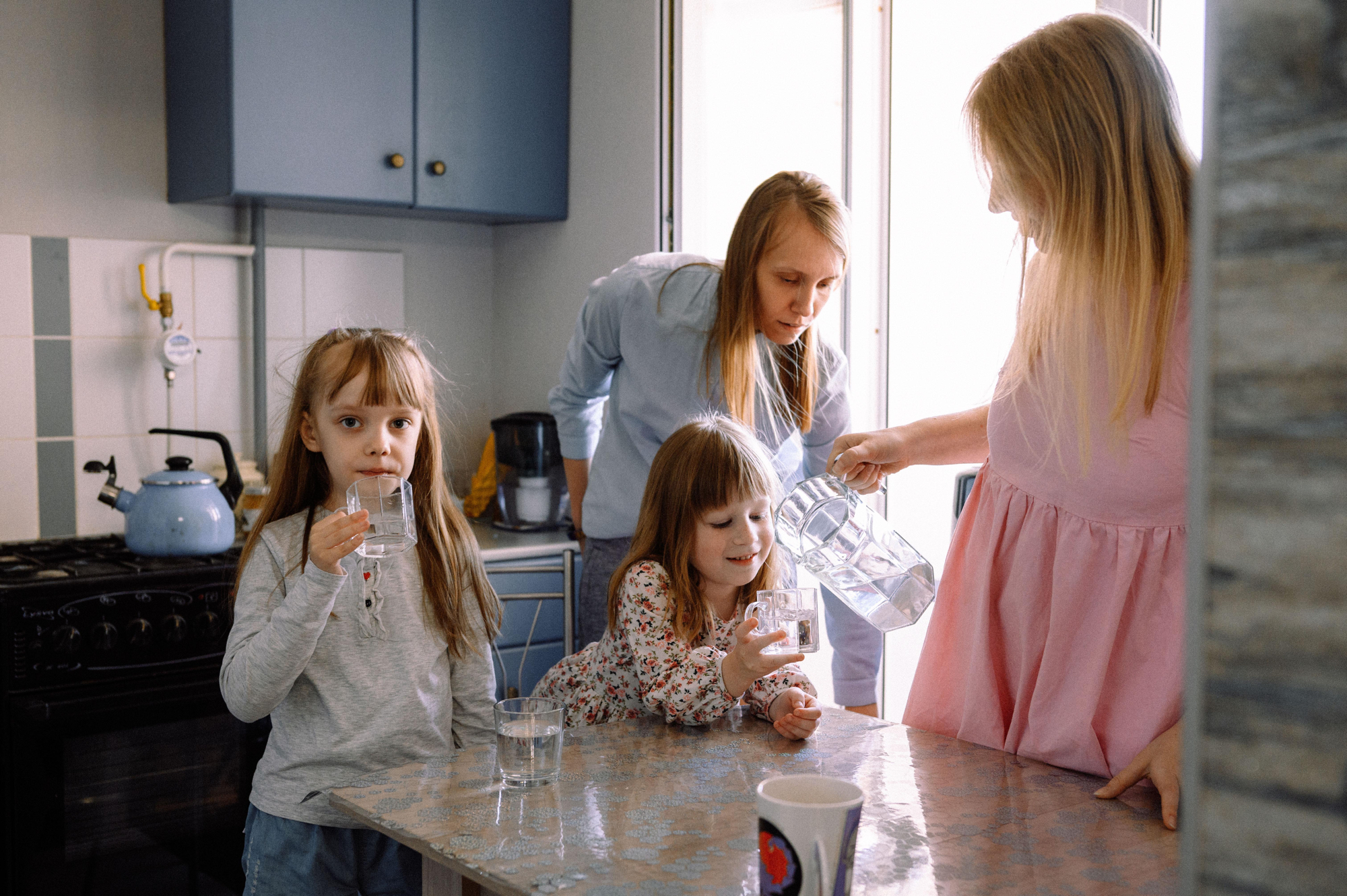
Anya and Lera’s community of activists felt the walls closing in. “Every day, there was some news, like some club was closed, someone was fined,” Anya says. “It just kind of snowballed.” The couple worried for their safety, for the future of their relationship in a country with no social or legal support for lesbian couples, and for their children, who Anya worried would absorb the surrounding homophobia and grow to hate their parents. Sitting in Anya’s kitchen one night in April, Anya asked Lera if she would leave with her to seek asylum in the United States, where she believed they would be accepted as both lesbians and immigrants.
The US asylum process is daunting: After surrendering to immigration officials, seekers must satisfy an exhaustive list of legal requirements, including identity and security checks and providing proof that they risk persecution in their home countries. Resolution often takes years. Anya and Lera would be leaving their former lives behind, and Lera would also be leaving her son with his father—without knowing when or if she’d see him again. Still, Lera says, “I suddenly realized that I could not live in Russia, that my relatives and homophobic people won’t let me.” Finally, Lera said yes.
Lera told no one about the plan—not even her daughter.
Anya felt relief as the couple threw themselves into planning, selling Lera’s old car and converting Anya’s life savings to US dollars. They mapped out a late-June itinerary that would take them from Perm to Moscow to Istanbul and then on to Tijuana, Mexico, where they would walk across the border into California. Anya made arrangements for her beloved cat, Mura, to live with relatives and asked an old work colleague who had emigrated to Virginia if she’d act as their sponsor in the asylum process.
Lera was relieved, too. Yet her heart was heavy. She grieved over leaving her son and worried about her daughter. According to Russian law, either parent can prevent a child from leaving the country. Lera wasn’t confident her ex would allow her daughter to depart with her, even if he thought it was simply for a vacation. So she told no one about the plan, not even her daughter.
Despite these anxieties, everything was on track—and then, a few weeks before their departure date, the head of Rainbow World approached Lera asking permission to anonymously share the story about her former mother-in-law with a popular local news website that was producing an article about attacks on LGBTQ+ people. The article was published on June 5. While not identifying Lera by name, it included identifying details such as her daughter’s age. Lera was horrified, especially when she saw a comment posted on the article including an email address she recognized as her ex’s: “People, this is a cry from the soul! I am the father of the children in this story. Please help! I am sure that people from law enforcement agencies and lawyers are reading this story. Help me take my daughter from this ‘Rainbow World.’ ”
Other commenters called Lera a “pervert” and said her children should be taken from her. Afraid she would be physically attacked or that Russian social services would intervene to take away her custodial rights—as has happened to other LGBTQ+ parents in Russia—Lera moved out of Anya’s apartment and back into her parents’ house, intending to hide out until they left.
On June 17, 2022, the couple took two suitcases and their daughters to the Perm airport. They abandoned their other possessions—even the “Dreams Come True” wrapper from their first date, still on Anya’s wall. All through the airport and the flight to Moscow, until the moment the wheels lifted on their flight to Istanbul, neither Lera nor Anya could shake the fear of being turned back. In the air leaving Russia, Anya says, “I felt immediate happiness that the girls would be safer.”
But Lera still felt a “weight.” She had enjoyed a few extra days with her son before she left—her ex was traveling, and the boy stayed with her at her parents’ house. However, Lera couldn’t tell him it was their last time together, because she was scared he would tell his father. On their final day, she took him back to his father’s house. “I hugged him and said some kind words and that I love him,” she says softly, “and he just went in and closed the door behind him.”
In her suitcase, Anya had packed a ring in a small yellow box, decorated with a rainbow flag. On the couple’s first stop, in Istanbul, they met with Russian-expat friends at a restaurant with romantic views. The friends ordered dessert, hiding the box on the plate where Lera found it. “I didn’t even understand at first what it was,” she says. “I looked at Anya and I said, ‘Did this come with the dessert?’ ”
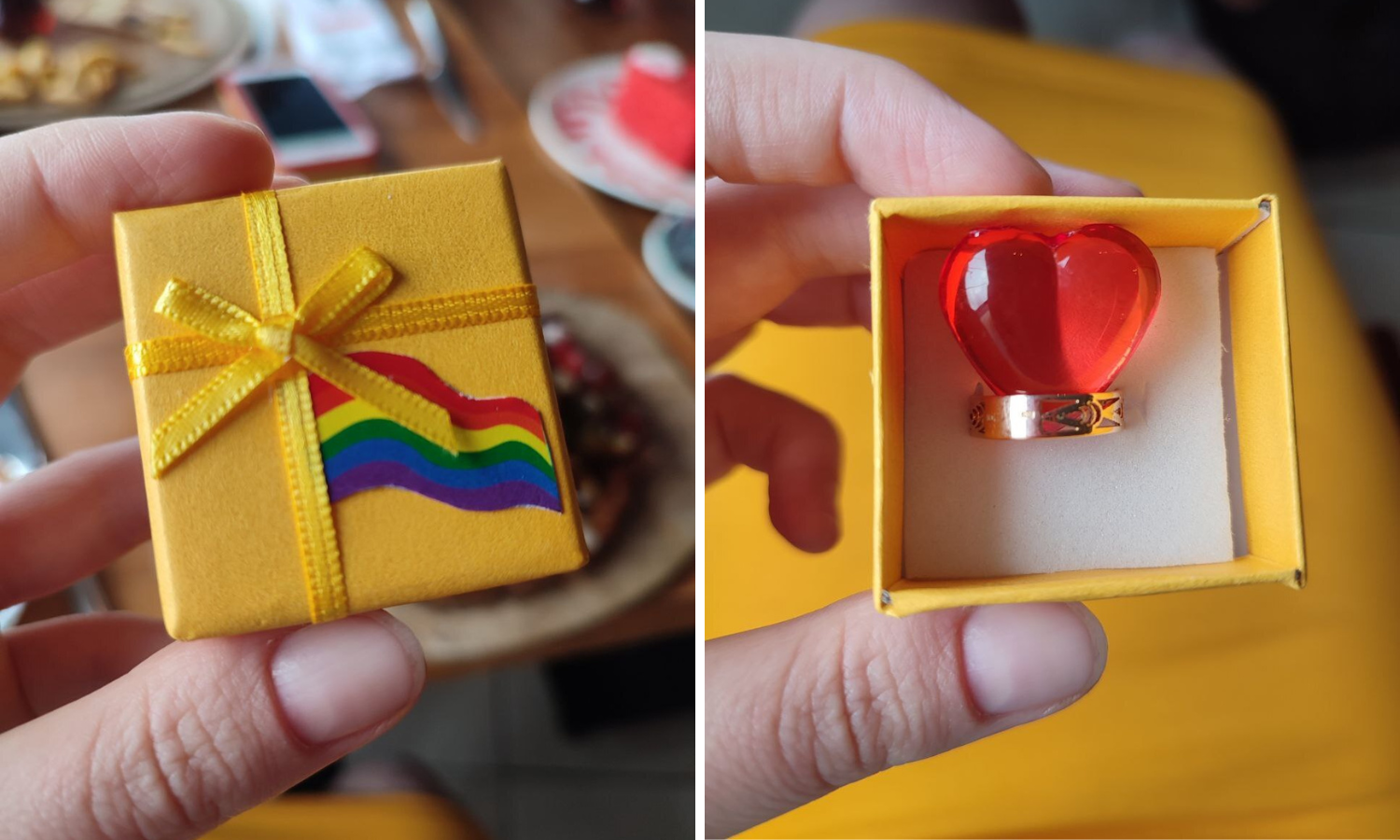
In Mexico City, Lera was questioned for several hours in immigration. In Tijuana, the newly engaged pair was placed on a waitlist for entry into the US. They took their suitcases to El Jardin de las Mariposas, a shelter for LGBTQ+ asylum seekers. For three weeks, they waited: sleeping on camp beds in a tiny unused computer room, occupying the children with video games and crayons, and going on weekends to a hotel that allowed shelter guests to use showers and the pool. The shelter was so close to California that Anya and Lera could see the border from an upstairs terrace. “We are waiting until we can cross there,” they would say to the girls. On July 25, it was finally time. At 6 in the morning, an escort arrived and helped the family walk into San Diego.
While estimates vary, it’s possible that more than a million Russians have fled the country since the war in Ukraine began. Many are frightened of being conscripted into military service and killed. Others are political exiles. LGBTQ+ Russians face additional fears: In December 2022, the country expanded its 2013 “anti-propaganda” law, essentially criminalizing all public expressions of queerness. Last summer, Russia outlawed gender-affirming care, barred transgender people from adopting children, and annulled marriages in which one person has “changed gender.”
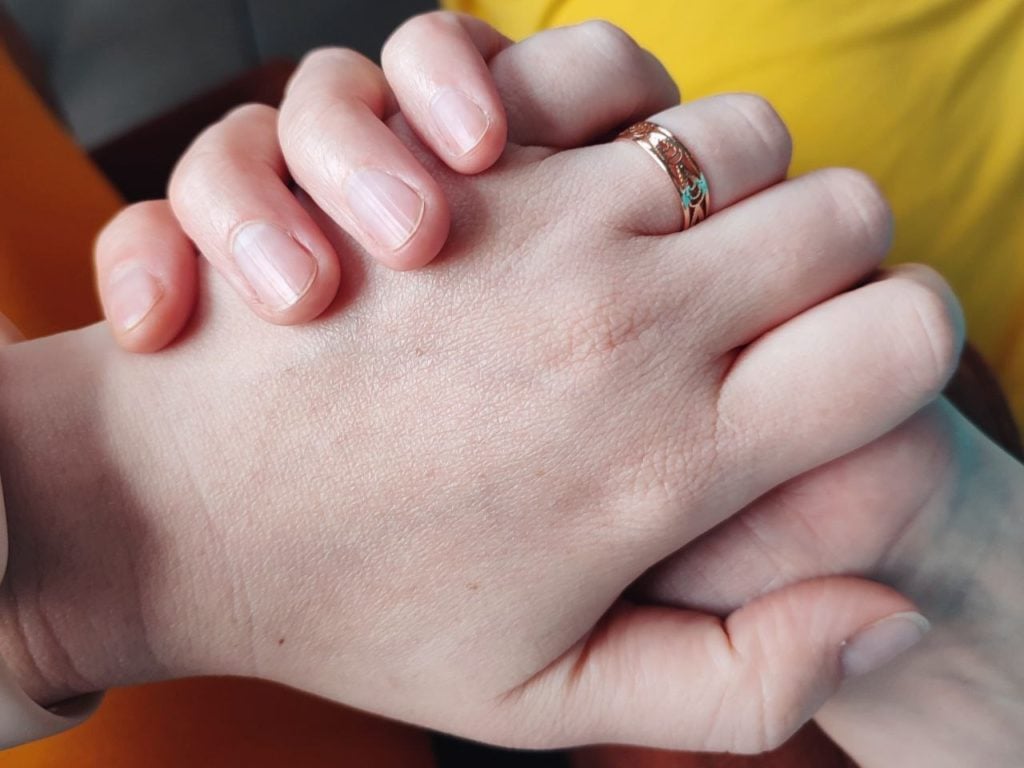
Due to large numbers of Russian asylum seekers, certain European countries have been reluctant to let them in. Even in the US, which has been relatively welcoming, some Russians have reported long detentions and poor treatment at the border. The US asylum system in general is enormously backlogged, and the Biden administration has sought to restrict asylum at the southern border. Anya says that “after everything we’d been through, there was no fear” of what would happen if they were turned back: “There was no other option.” Lera and Anya say border officials were gentle with them, offering snacks. After they were processed, volunteers helped them move into a hotel, where they took Covid tests and waited for results for three days before flying to Virginia to meet Elena, their sponsor and Anya’s old work friend.
When Elena arrived in the US in 2012, friends and strangers helped her find an apartment, furnishings, and contacts that helped her get steady work. Now, she says, “I’m on the giving side.” She moved Anya and Lera into a small Northern Virginia apartment she owns, stocking it with furniture, kitchenware, and clothes assembled via donations and her local Buy Nothing group. Elena also connected the couple with Ava Benach, a DC immigration lawyer who specializes in LGBTQ+ asylum seekers, and helped translate in situations in which their limited English wasn’t enough. By August, when they were settled into the apartment, Lera was finally able to release the knot of anxiety that had been tightening inside her for months. “We have a home,” she remembers thinking, “and we are safe.”
In September of this year, I met Anya and Lera at the Northern Virginia apartment, a neat and bare space decorated with Lera’s photos. Leaning near the door are the twin scooters they use to get around—each with a daughter in tow—because they don’t yet have drivers’ licenses. Soft-spoken, kind, and shy with their new English words, they offered me and my interpreter nuts and soft drinks. Lera is gentler and more expressive, Anya more plain-spoken and very protective toward Lera, watching her with a fond, sometimes amused smile and occasionally reaching out during a painful story to stroke her shoulder.
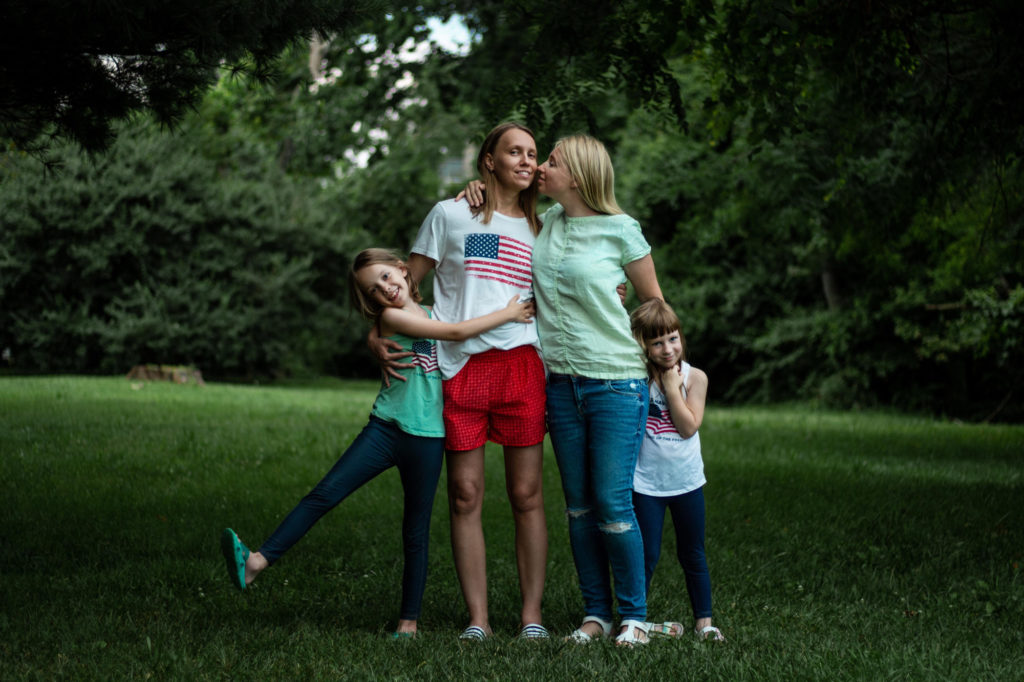
Near the end of our conversation, Lera mentioned we were just a few days away from a very special moment: their one-year wedding anniversary. They’d been married in September 2022 at the home of Nancy D. Joyner, a licensed officiant who, after learning of their story, set out Champagne and cake over a Pride-flag tablecloth and invited some of her friends over to make the day extra festive. The couple wore matching peasant-style white dresses. Afterward, they walked to a grassy area near their apartment building, where Elena photographed them holding each other and looking radiant. Their neighborhood is largely made up of Spanish-speaking immigrants, and Anya and Lera have made connections despite the language barrier. On their wedding day, “kids were coming up to us and wanted to congratulate us, and people were walking up and wanting to take photos with us,” Lera says, still sounding astonished by the ability to be safely gay in public.
In June, Anya and Lera were granted asylum, putting them on a path to obtaining green cards and, eventually, citizenship. Back at their apartment, the two seem hopeful: awaiting their work visas, focused on English classes, and determined to make the most of their fresh start. Their daughters are adjusting to American life, learning English rapidly and settling into their school. Lera misses her son deeply but still speaks with him over video chat from Russia. She no longer worries as much about her ex-husband, although she and Anya asked to not include their full names in this story out of caution over how it could impact her relationship with her son.

Anya and Lera’s relationship—relatively new when they fled home together—has been put to a severe test. It still sustains them. “On one hand, we have more stress and fight a little more often than we did in Russia,” Lera says as Anya smiles indulgently. “But on the other hand, I feel like we’re stronger. We got married—we’re an official family, finally. And I’m just really ecstatic that together we can achieve a lot.” Giving Anya a shy glance, Lera continues: “It feels almost like I have wings on my back.”
Correction: The print version of this story incorrectly stated that “border officials” tested Lera and Anya for Covid and moved them into a hotel, where they stayed for a night. Private volunteers helped move the couple into a hotel, where they took Covid tests and stayed for three days while waiting for results. The online version of this story has been updated accordingly.
Tanya Paperny provided translation for this article, which appears in the December 2023 issue of Washingtonian.
